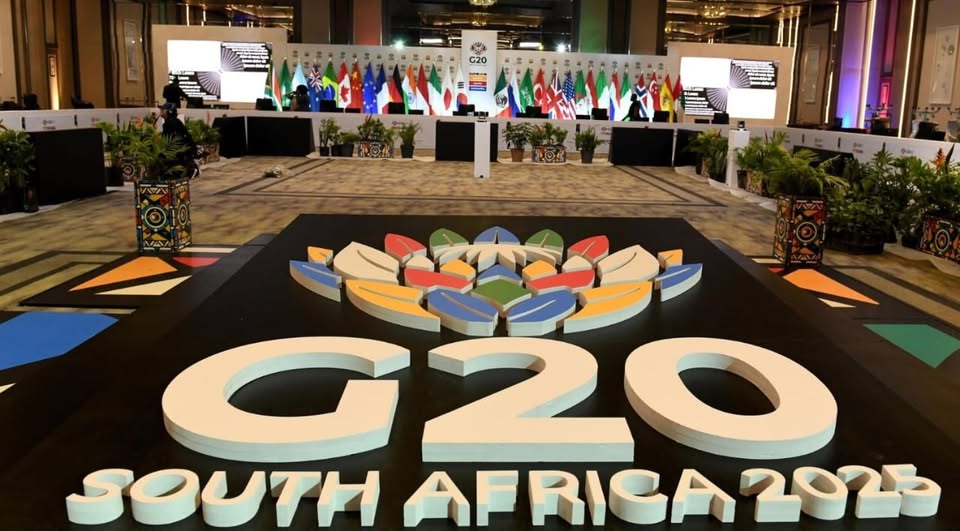
A sense of shared humanity echoed especially strongly at the end of Ramaphosa’s opening address, when he inadvertently, as the cameras rolled, announced the unanimous adoption of the Leaders’ Declaration.
“The challenges we face can only be addressed through collaboration, cooperation, and partnership. The adoption of this declaration should send an important signal that multilateralism can and does deliver, and that it offers hope and solidarity to the world.
“As leaders of the G20, we will hold fast to our solemn pledge to leave no person, no community, and no country behind,” he said.
And with these words, the G20 Leaders’ Summit was officially declared open.
This year marks the first time the G20 has convened in Africa. Fittingly, the Leaders’ Declaration invokes the African philosophy of Ubuntu, often translated as ‘I am because we are’, to emphasise that no nation can prosper in isolation.
The declaration reaffirms the global community’s interconnectedness and its commitment to multilateral cooperation, macro-policy coordination, and partnerships for sustainable development.
Ubuntu as a guiding principle for agriculture
Speaking to SABC News at the G20 Leaders’ Summit, Agriculture Minister John Steenhuisen welcomed the adoption of the Leaders’ Declaration, especially its focus on food security. He said this commitment could be strengthened even further by applying Africa’s philosophy of co-operation. “We can take this even further if we live by the principles of Ubuntu. We must prevent the disparities we see across the world, where some countries have vast food surpluses while others do not have enough.”
Steenhuisen said overcoming persistent “Afro-scepticism” will require African countries to show stronger unity and take greater responsibility for their agricultural systems.
He added that poor infrastructure remains one of the biggest obstacles to intra-African trade, pointing out that
“Right now, it is cheaper to import maize from Mexico or the DRC than it is to move it from Zambia or South Africaand that cannot be right. We need to improve the systems that allow us to move goods and services across our own continent efficiently” Steenhuisen said.
He emphasised that Africa is uniquely positioned to become a major global food supplier.
“We have the land, we have the soil, we have the peopleand our counter-seasonality gives us a significant advantage.If we stand together as a continent, share knowledge and expertise, and build resilient distribution systems, Africa could quickly become the world’s food destination and supplier. That would provide African economies with real opportunities for trade, growth, and job creation” Said Steenuisin.
The spirit of Ubuntu has shaped South Africa’s agricultural agenda for its G20 presidency. In September, at the second meeting of the G20 Agriculture Working Group, Minister of Agriculture John Steenhuisen urged G20 nations to adopt Ubuntu as a framework for addressing shared challenges in agriculture, food security, and rural livelihoods.
“In South Africa, we have come to realise that neither government, nor the private sector, nor donors alone can solve the complex challenges we face. It is only through partnerships, through the collective wisdom of our shared humanity, that we can create lasting solutions. That is Ubuntu in action,” Steenhuisen said.
He highlighted the mounting pressures on global agriculture: rapidly spreading animal and plant diseases, escalating climate impacts, entrenched poverty, and worsening hunger. These challenges, he argued, are too large and too interconnected for any one country to face alone.
A data-driven push for food security
In September, South Africa hosted the three-day Ministerial Meeting of the G20 Food Security Task Force in Somerset West, Western Cape. Here, ministers, deputy ministers, and technical representatives from across the G20 deliberated on data-driven solutions for food security and inclusive agricultural investment.
“We need to invest in climate-smart agriculture: drought-tolerant seed, efficient irrigation, and soil-water analytics that make farming more adaptive. We must diversify food sources, strengthen local and regional value chains, and reduce overreliance on imports,” Steenhuisen told delegates.
He added that smallholder and family farmers must be supported with inputs, extension services, finance, and interventions to reduce post-harvest losses. Building cold-chain systems, improving storage and logistics, and diversifying crops towards more nutrient-rich foods are all critical steps.
Steenhuisen also noted that South Africa, together with international partners, is working to build resilience against market shocks, create new export opportunities, and expand the participation of youth and women in the agricultural economy.
“Food security has always been central to South Africa’s development and to the stability of our continent. For us, this is not an abstract debate; this is about the daily reality of affordability, accessibility, and nutrition for our people,” he said.
A continental challenge
South Africa currently ranks 59th on the Global Food Security Index; not because of insufficient food supply, but due to weaknesses in sustainability and adaptability. Across Africa, hunger remains widespread, affecting more than 300 million people in 2024.
In the Southern African Development Community region alone, 48 million people are classified as facing Phase 3 (Crisis) food insecurity, according to the Integrated Food Security Phase Classification.
While South Africa is not among the nine most severely affected nations, Steenhuisen emphasised that Ubuntu compels solidarity: “The spirit of Ubuntu reminds us that this suffering diminishes us all.”
As South Africa leads the G20’s agricultural agenda, the question emerges: can Ubuntu, the philosophy that binds communities through shared humanity, also guide the world towards lasting food security? If global leaders take their pledges seriously, it may yet prove to be the only viable path forward.
Get trusted farming news from Farmers Weekly in Google Top Stories.
➕ Add Farmers Weekly to Google ✔ Takes 10 seconds · ✔ Remove anytime






